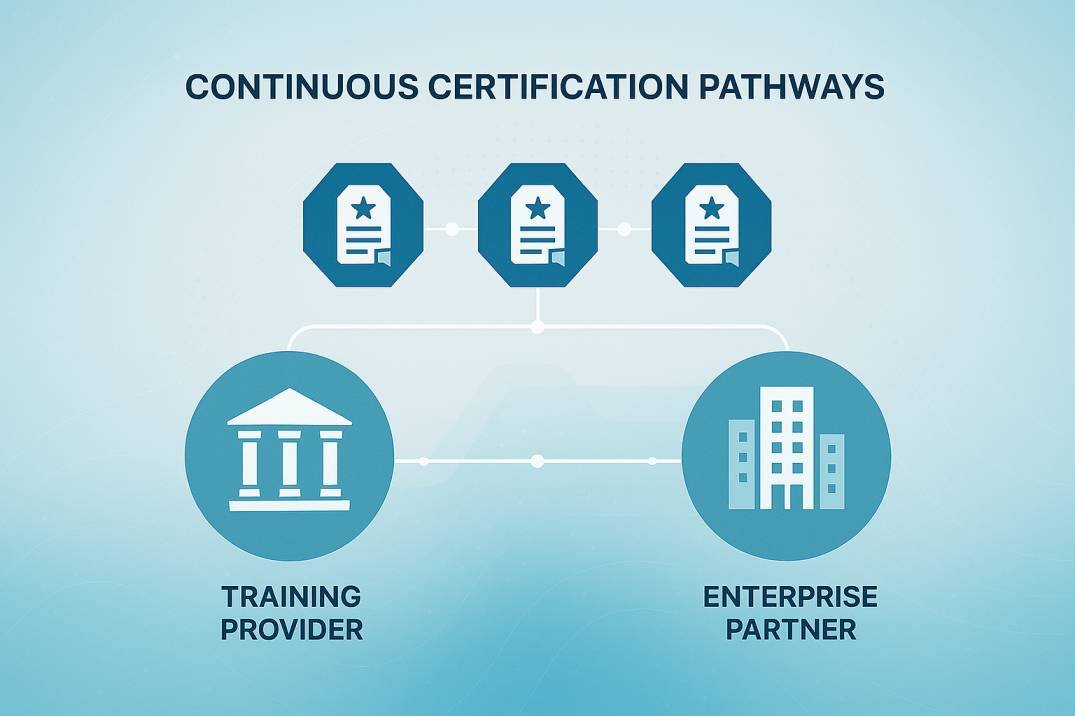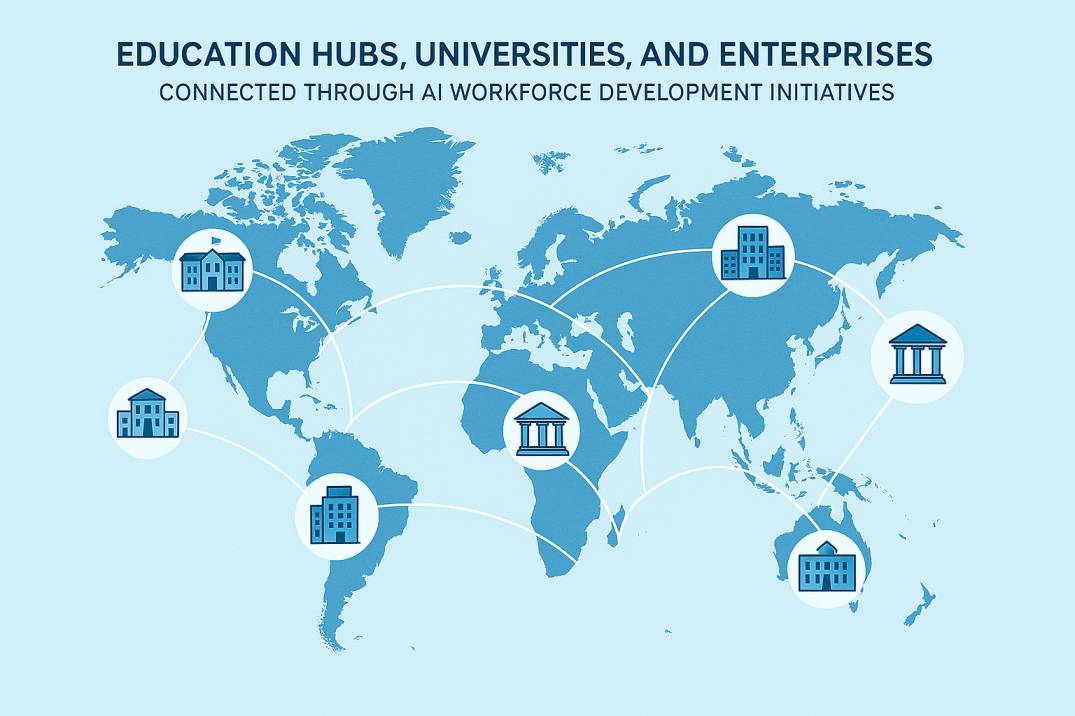Leading with Skills, Not Just Content: The AI CERTs Partner Edge
The landscape of education and professional training has shifted. Learners no longer want courses that only deliver information—they demand practical skills they can use immediately. Employers echo this demand, prioritizing job-ready talent over theoretical knowledge.
This is where the AI CERTs partner edge comes in. Through an established AI partner program, training providers, universities, and institutes can deliver skill-based training that aligns with industry expectations. Rather than just providing content, these programs focus on hands-on learning, role-based certifications, and measurable learner outcomes.
For institutions looking to differentiate themselves, partnering with an AI training institute and aligning with a partnership on artificial intelligence means leading with skills that matter.
Why Content Alone Isn’t Enough
The digital world is overflowing with free and paid AI content—blogs, videos, and online tutorials. But content does not equal capability. Employers are not asking whether learners watched a video or read a course module; they want proof that learners can:
- Apply AI tools in business environments.
- Solve real-world problems using data and machine learning.
- Demonstrate hands-on proficiency in projects.
This is why AI certs skill-based training matters more than ever. Certifications that validate ability—not just exposure—stand out in the marketplace.
The Shift Toward Skills-Based Certifications
Traditional certifications often emphasized knowledge checks: quizzes, multiple-choice tests, and static content. But the new generation of role-based certification programs evaluates learners on tasks aligned with specific industry roles.
For example:
- A data analyst certification requires learners to interpret datasets, not just define terminology.
- An AI developer certification expects coding proficiency, not just conceptual understanding.
- A business AI certification measures the ability to apply AI solutions to enterprise challenges.
These role-based programs ensure learners graduate with abilities employers directly need.
How AI CERTs Enables Skills-First Training
Partnering with AI CERTs ensures institutions move beyond content to deliver hands-on learning and demonstrable skills. Here’s how:
- Practical labs – Students work with AI tools in real-world simulations.
- Project-based assessments – Certification outcomes are tied to deliverables, not just exams.
- Job-role alignment – Programs are designed around roles like AI strategist, data analyst, or AI developer.
- Global recognition – Through a partnership on artificial intelligence, certifications carry international credibility.
This model guarantees that learners don’t just know AI—they can do AI.
Why Providers Benefit From Skills-Based Partnerships
Training providers gain a competitive advantage by delivering certifications that employers trust. Benefits include:
- Differentiation – Stand out from content-heavy providers.
- Higher enrollments – Learners prefer programs with measurable outcomes.
- Stronger employer partnerships – Companies are more willing to fund employee training.
- Long-term credibility – Programs stay relevant through role-based updates.
By leveraging an AI partner program, providers position themselves as leaders in skill-driven education.
The Role of Universities and Institutes
Universities and AI training institutes also gain significantly from skill-based certifications. Embedding AI certs learner outcomes into academic programs ensures:
- Students graduate with both degrees and job-ready skills.
- Universities align with employer expectations, boosting placement rates.
- Academic credibility is enhanced by global, co-branded certifications.
- Students view institutions as forward-looking, industry-aligned leaders.
In today’s education marketplace, this combination of academic knowledge and practical certification is a winning formula.
Hands-On Learning: The Differentiator
Employers value evidence of applied ability. AI CERTs programs emphasize hands-on learning through:
- Capstone projects tied to industry challenges.
- Use of AI platforms, datasets, and tools.
- Assessment methods that evaluate real-world application.
This approach ensures learners don’t just complete a program—they build portfolios that demonstrate their skills to future employers.
Outcomes That Matter
Ultimately, the effectiveness of any certification comes down to learner outcomes. AI CERTs tracks and delivers outcomes such as:
- Job readiness – Graduates step into roles with confidence.
- Career advancement – Professionals leverage certifications for promotions.
- Employer trust – Companies adopt AI CERTs as benchmarks for hiring and upskilling.
- Global portability – Certifications carry recognition across borders.
This is the AI certs learner outcomes advantage: measurable success for students, providers, and employers alike.
Real-World Example: Skills in Action
Consider a university that integrated role-based certification programs into its computer science curriculum. Instead of simply offering AI electives, the university partnered with AI CERTs to embed skill-based certifications.
- Students built real AI projects during their studies.
- Employers began actively recruiting from the program, citing job readiness.
- Enrollment in AI-related majors increased by 30% within two years.
The difference came from focusing on skills—not just content.
Why Skills-First Is the Future of AI Education
As AI becomes central to every industry, content-driven programs will fade into the background. The future belongs to providers and institutions that can prove their learners have mastered real-world skills.
- AI certs skill-based training is the foundation.
- Role-based certification programs align learners with job roles.
- Hands-on learning ensures applied knowledge.
- Learner outcomes define success and build trust.
Together, these elements create the AI CERTs partner edge—a clear advantage for those who choose partnership over standalone efforts.
Final Thoughts
The education industry is at an inflection point. Institutions that continue to rely on content-heavy programs risk being left behind. Learners and employers demand proof of skills, not just exposure to information.
By joining an AI partner program, working with an AI training institute, and aligning with a partnership on artificial intelligence, providers gain the ability to deliver certifications that transform careers.
The future of AI education belongs to those who lead with skills. With AI CERTs, training providers, universities, and institutes don’t just deliver courses—they deliver outcomes. That’s the partner edge.
Recent Blogs

FEATURED
Digital Transformation: How AI Partnerships Accelerate Institutional Success
February 25, 2026
FEATURED
How to Position Your Institution as an AI-Enabled Future-Ready Campus
February 24, 2026
FEATURED
Can Training Providers Support Lifelong Learning?
February 19, 2026
FEATURED
The Top 5 AI Training Questions Training Leaders Are Asking in 2026 (And How Partnerships Provide Answers)
February 19, 2026
FEATURED
UN Approves Global AI Scientific Panel: What It Means for AI Training Partnerships
February 19, 2026

